Reclaiming the travel joy
Restorative times in Liberia
LIBERIA
Since I posted about the accidents in Sierra Leone we’ve had so many supportive messages from family and friends all over the world – thank you so much for your concern and reassurance. It has really helped. We hate to worry people. But there are some harsh realities here that, frankly, are worrying. We’ve always had our eyes wide open to the risks of driving through this continent. Obviously, no one ever wants to see up close what those risks actually mean but, nevertheless, we accept them. Negative experiences will not define our journey.
Having said all that, we left Sierra Leone in an extremely sombre mood. This wasn’t really about us; people had died. There wasn’t a positive way of looking at that, no way to shake off the sadness and the shock of the circumstances with a simple pep talk. It needed time.
We crossed the border into Liberia. Another English-speaking country, it has a long, complicated, historical connection with the US. In the early 1800s Congress provided funding to send freeborn black people and emancipated slaves there to establish a colony in what was then called the Grain Coast. As you can imagine, this ‘repatriation’ wasn’t a wholly altruistic policy. To this day the country uses a dual currency of US dollars and Liberian dollars (which they call ‘Liberty’ and, confusingly, has a totally different value than the regular dollar). Those US influences are immediately apparent in the way the border guards dress and talk, which was quite disconcerting.
We headed straight for a surfing town not far from the border, called Robertsport. It was a pretty raw time. Inevitably, we felt more vulnerable and a bit jumpy on the road. We just needed to sit and stare into the middle distance for a while. We camped in a peaceful guesthouse garden overlooking the beach from up on a hill.
It was kind of a strange town. Maybe we would have felt odd in any place at that point. Yet again, we lamented on the untapped potential of this beautiful spot. It looked to be in a bad way, economically-speaking. There’s a surf club that seemed to be thriving, and people were out on the waves, but the area didn’t have the social life that often goes hand-in-hand with the surf crowd.
We wandered past this huge seemingly abandoned beachfront campsite – what a location! – and fantasised about what we could do with it, should we ever somehow find ourselves re-locating to Liberia…
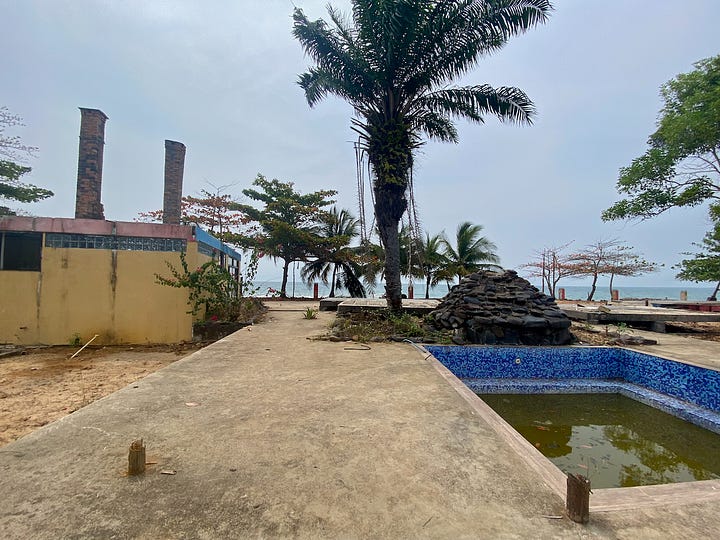
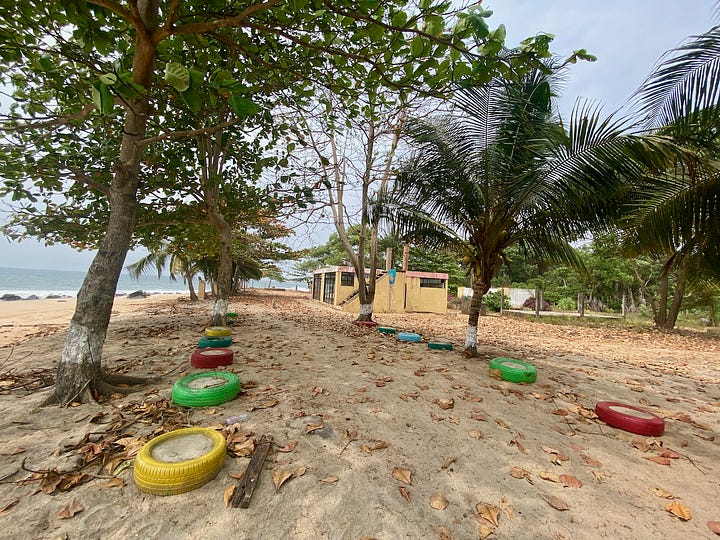
The small town was friendly and rustic. We went round the little stalls and shack-shops to try to stock up on some food, cobbling together meals from tiny piles of tomatoes, onions, okra, and squash.
We were also on the hunt for some kind of rodent poison…
I didn’t mention it in the last post, as it was so trivial under the circumstances, but the day after the fatal accident, we woke at sunrise to what we believed were the cute wildlife sounds of the jungle. We commented on all the rustling and snuffling we could hear outside. Except, as it transpired, the sounds weren’t outside. When I went into the cupboard for breakfast stuff there was pasta strewn all over the place. A dastardly mouse had chewed through the packet and chucked rigatoni around like confetti. On the front cab floor we also found insulation material, which it was probably using to make a comfy nest. It wasn’t ideal – we were tired to the depths of our bones, but there was no escaping the fact that everything had to be unloaded from all the cupboards and cleaned. Obviously, the little git was nowhere to be seen.
We’ve been here before in our old van. Living in a tiny house with a tiny mouse is no fun. That time, in Brazil, we tried homemade traps. Forget it – mice just use them to score free snacks and laugh at you. This time we went straight for the nuclear option. English is spoken in Liberia but the accent and diction can be quite challenging and, in turn, we couldn’t always make ourselves understood. We resorted to showing people photos of rats and making unmistakeable gestures regarding what we wanted to do to it. Eventually we were directed to an arthritis medication from the local pharmacy. It’s a thing, apparently. I’m not quite sure how they made the leap from testing this drug on mice, to finding out that it killed them, to then using it on humans, but here we are.
Apart from the mouse wars, we had quiet, restful times – talking, walking, and pottering about.
When we moved on, we had a less restful journey around the capital, Monrovia. Thinking we were cleverly avoiding the city, we took a bypass route, crawling through a crowded, at times gridlocked, Saturday market and also doing our own shopping.
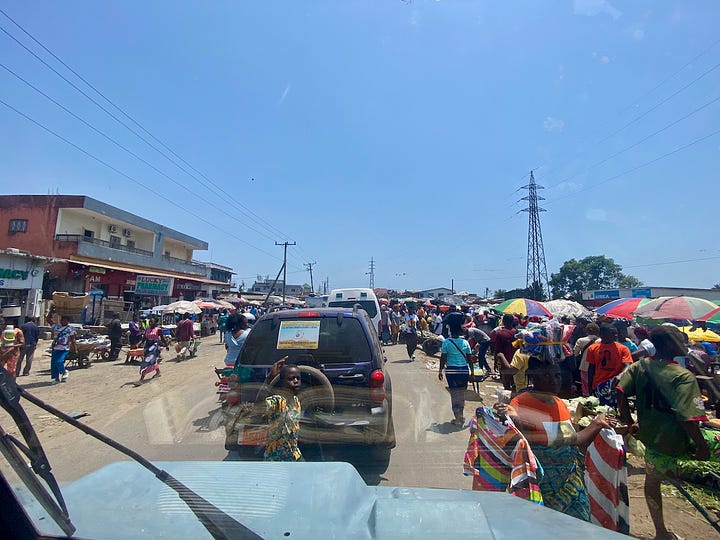
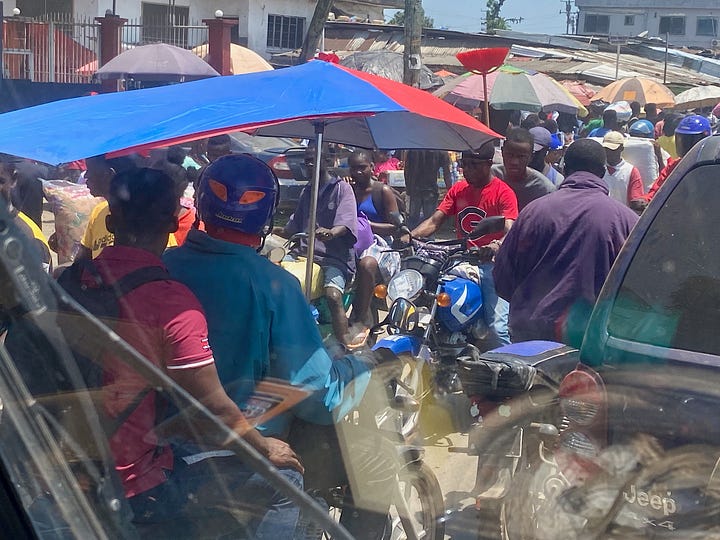
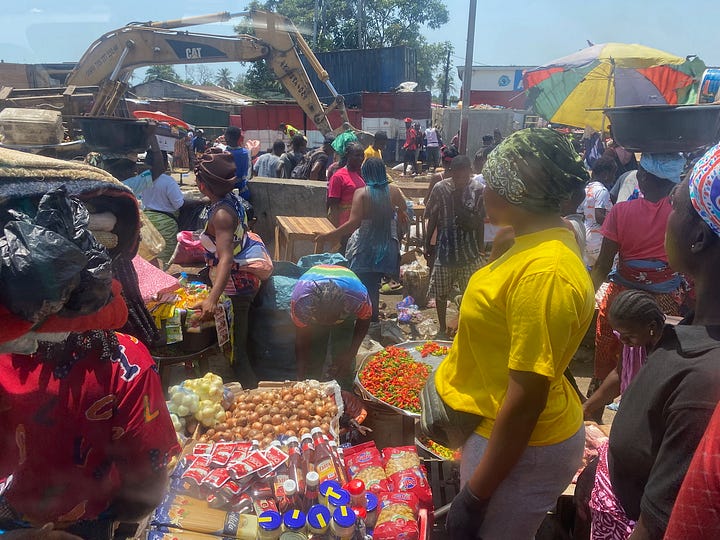
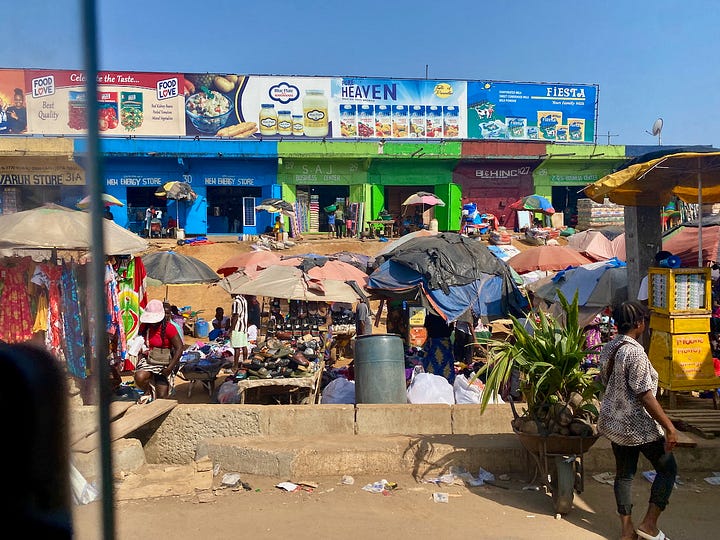
One essential task was replacing the used items in our first aid kit – we appreciate more than ever how important it is to carry these basic things. We also added more stuff to it following our experience at the accident, such as larger quantities of antiseptic alcohol, and sutures.
Free of the city, we headed north west. We’d had visions of Liberia potentially being a bit edgy. Again, our preconceptions were shattered. It was so welcoming. The police checkpoints were even smiley and only occasionally involved requests for ‘gifts’. These happen everywhere and until now we’ve dealt with them by being excessively chirpy.
“What have you brought for us?”, says the officer. “Just this massive smile,” I say, grinning like a maniac. And we all laugh, and off we drive.
And other than that one busy spot in Monrovia, our experience of the country was of a green, lush, calm place. It suited our needs. We passed by miles of rubber plantations and even ended up in one while looking for a bush camp. When we settled on a place, a large delegation from a nearby village came to find out what were doing there. This is fairly common, and is reassuring because it gives us the chance to check with the locals that it’s okay to park overnight. It’s incredibly important in these societies to greet people properly. Even if in that moment we are tired and secretly would like to be alone, we must be polite and friendly, shake hands, exchange names, enthuse, and explain why we are there. People are invariably a mixture of curious, delighted, bemused, and gobsmacked that we have driven from Belgium.
We went on to camp in some beautiful spots, almost all involving soothing water of some kind.
At Kpatawee Falls, loads of youngsters were playing in the pools when we arrived on a Sunday afternoon. We camped in the huge recreation area at the foot of the falls and people-watched, enjoying the life in the place. On Monday we had the entire place to ourselves. The best of both worlds.
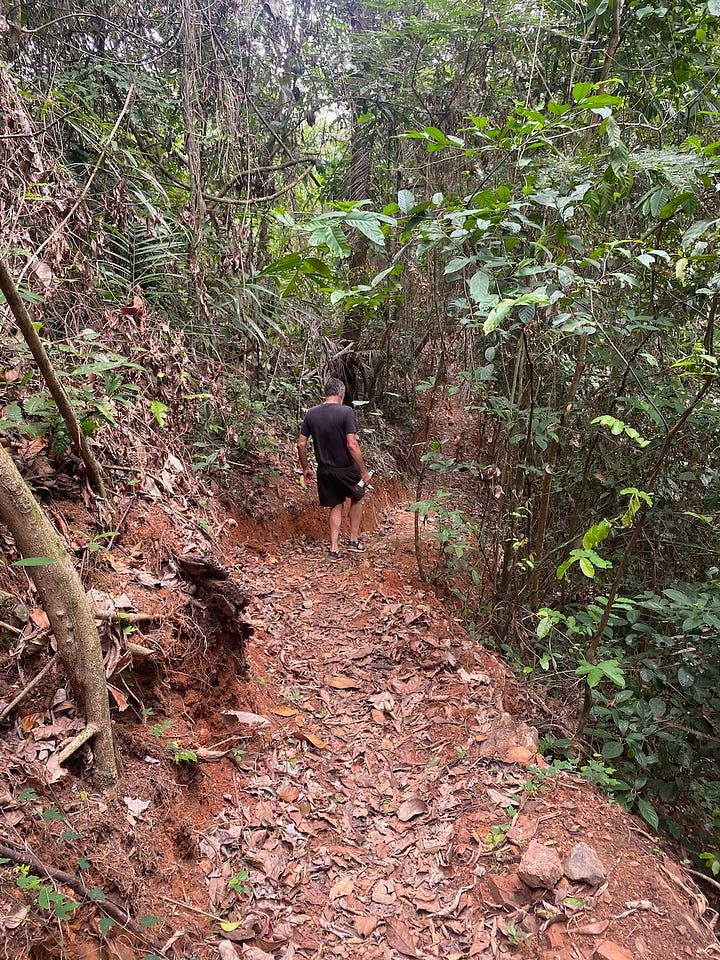
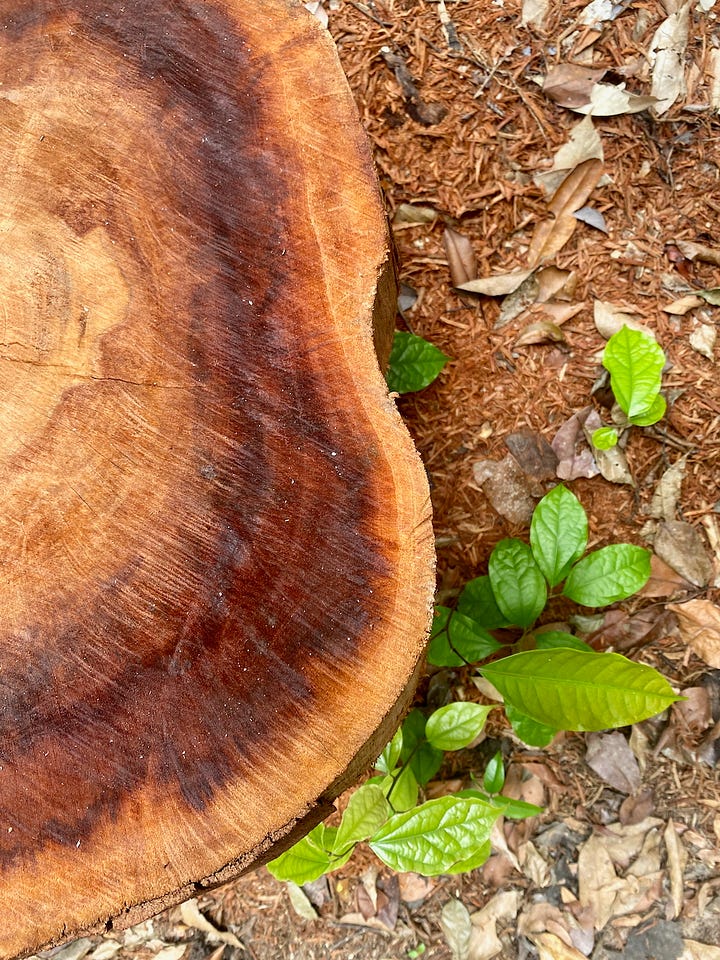
Meanwhile, for a few days Mr/s Mouse came out while we slept, ate drug-laced rice, then returned again for more the next night. We were either finishing it off regrettably slowly, or giving it a new lease of life by curing its arthritis. Eventually though, the late-night forays stopped. Sorry not sorry.
[Timelapse video: Leaving Kpatawee Falls]
At this place near Mount Nimba we camped alongside wonky treehouses and took dips in the river. Pineapples were growing all around the garden.
The staff were so lovely, and brought us morning mugs of tea made with homegrown lemongrass. When we ordered dinner – a delicious palm nut stew – they delivered it to our door. We felt nurtured and snoozed to the sound of the rapids on the river.
Talking of water, we’d been starting to get more rainstorms. One positive thing to have come out of our accident with the truck was that it had forced us to get on with re-doing the weather-proofing while we got the door repairs done in Freetown. The job they’d done was standing up well to some heavy downpours, and the inside was drier than it’s been in rain since we bought the truck.
Our final stop was a very posh lodge at Mount Nimba, where we treated ourselves to more water therapy – a pool with a hell of a view and an actual hot shower.
Mount Nimba Nature Reserve is a fascinating area that used to be the site of a vast iron ore mine owned by the now defunct Liberian-American-Swedish consortium LAMCO. Disrupted and eventually abandoned due to Liberia’s first civil war in the 90s, most of the structures and equipment were simply left where they stood. We love this kind of place – the detritus of an industrial past being reclaimed by nature, bit by bit; the two stories co-existing in unexpected harmony.
We took a guided walk with a couple of knowledgeable park rangers to learn a bit more about it. This lake only exists because of the mining. The bowl was blasted out and the water that seeped up used to be pumped out daily by the mining workers. When they left, it gradually filled up, consigning loads of heavy equipment to the watery depths forever. You can still see lamp posts sticking out.
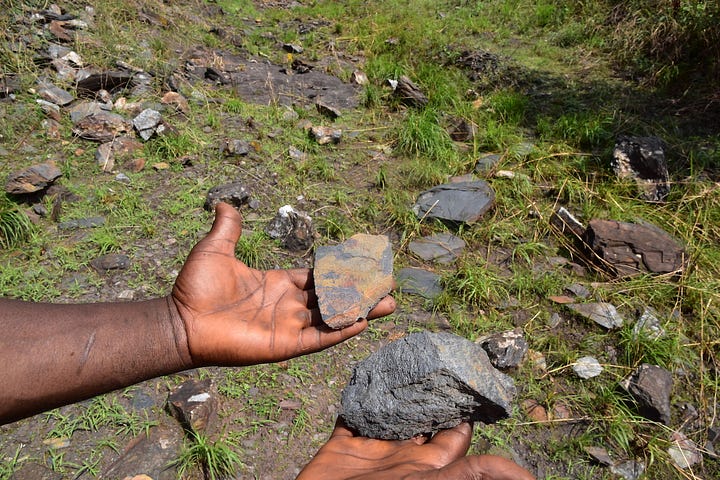
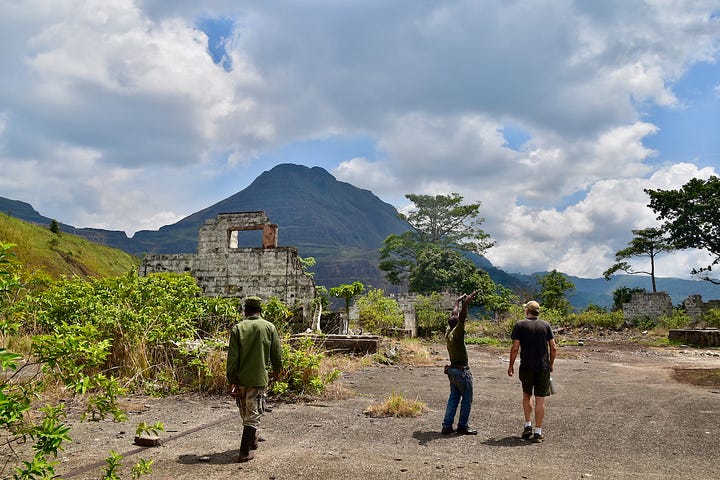
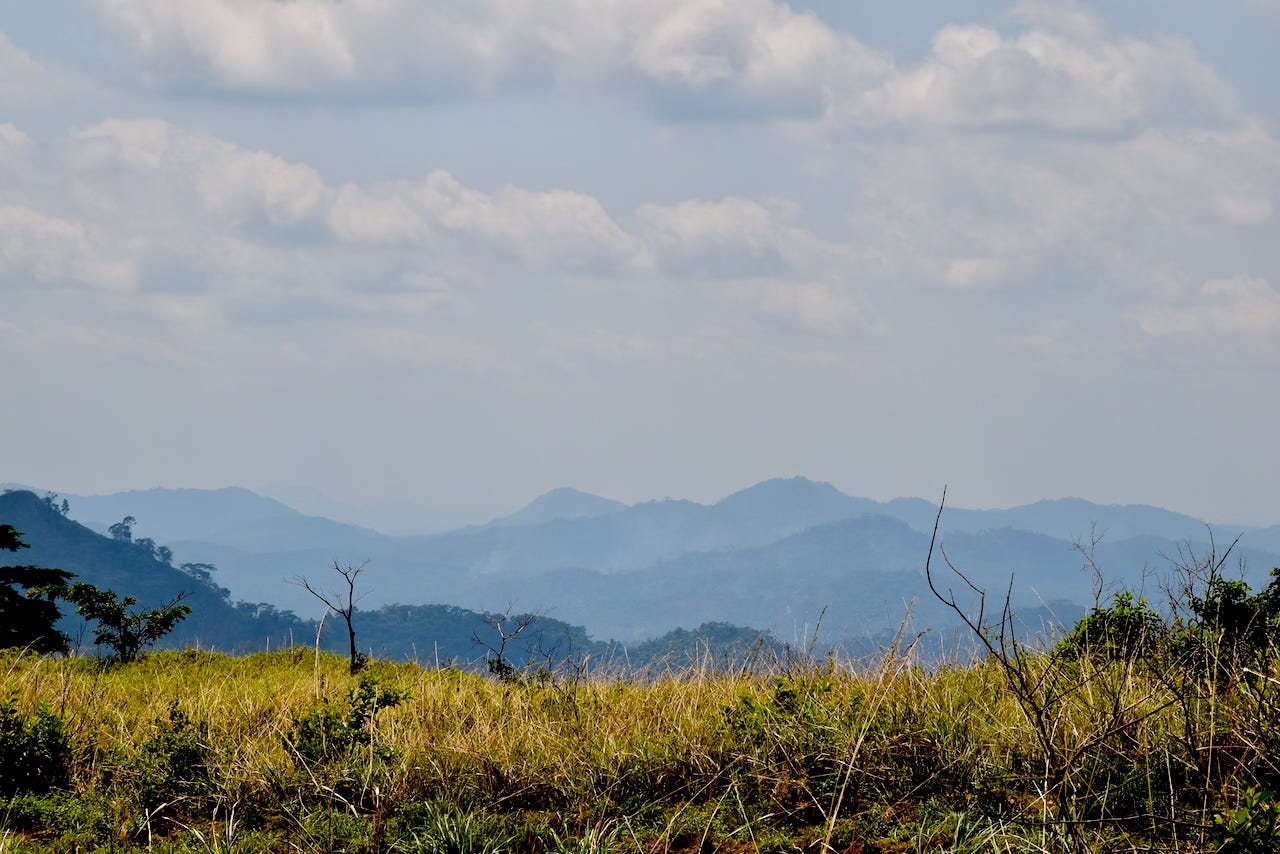
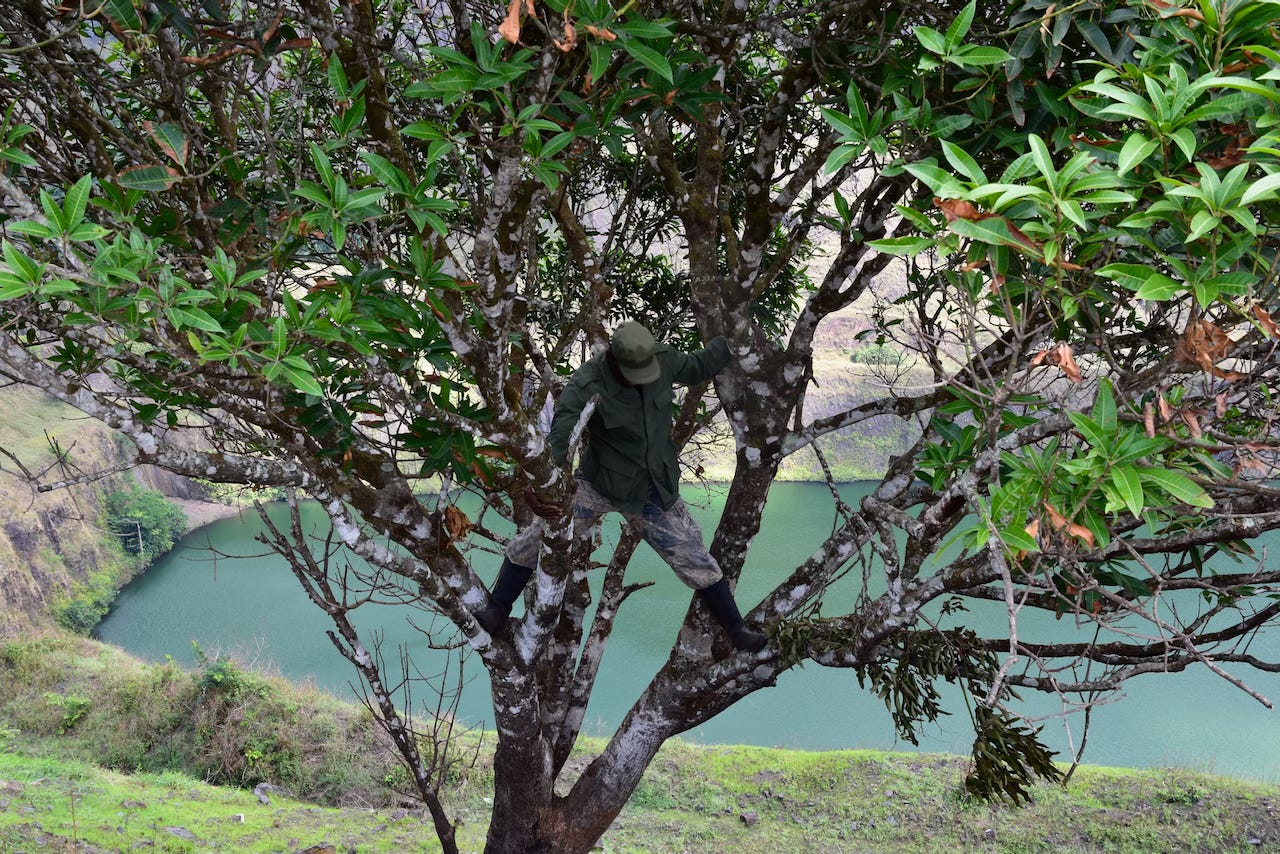
Mount Nimba itself is now protected but iron ore mining still happens in the area. The giant steel multinational ArcelorMittal has a massive visible presence and is Liberia’s biggest private sector investor and employer, which comes with a lot of power and influence.
There was still so much to understand about Liberia but our time there was brief. After just 11 days it was time to shuffle on. We were regaining our strength and enthusiasm for travelling. By its nature, this lifestyle does compel you to move forward, plan ahead, and experience new things. We hit the crappy road and headed for the mountains of Ivory Coast.


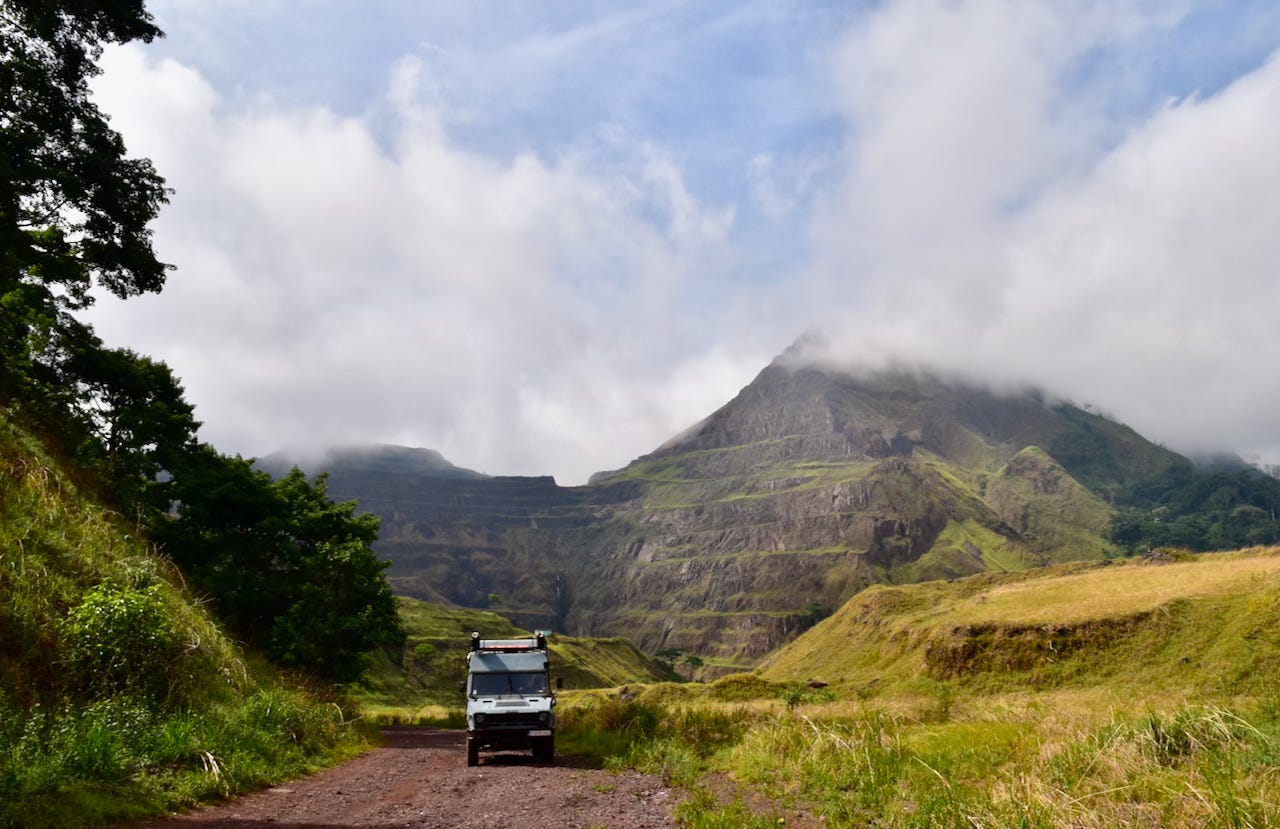





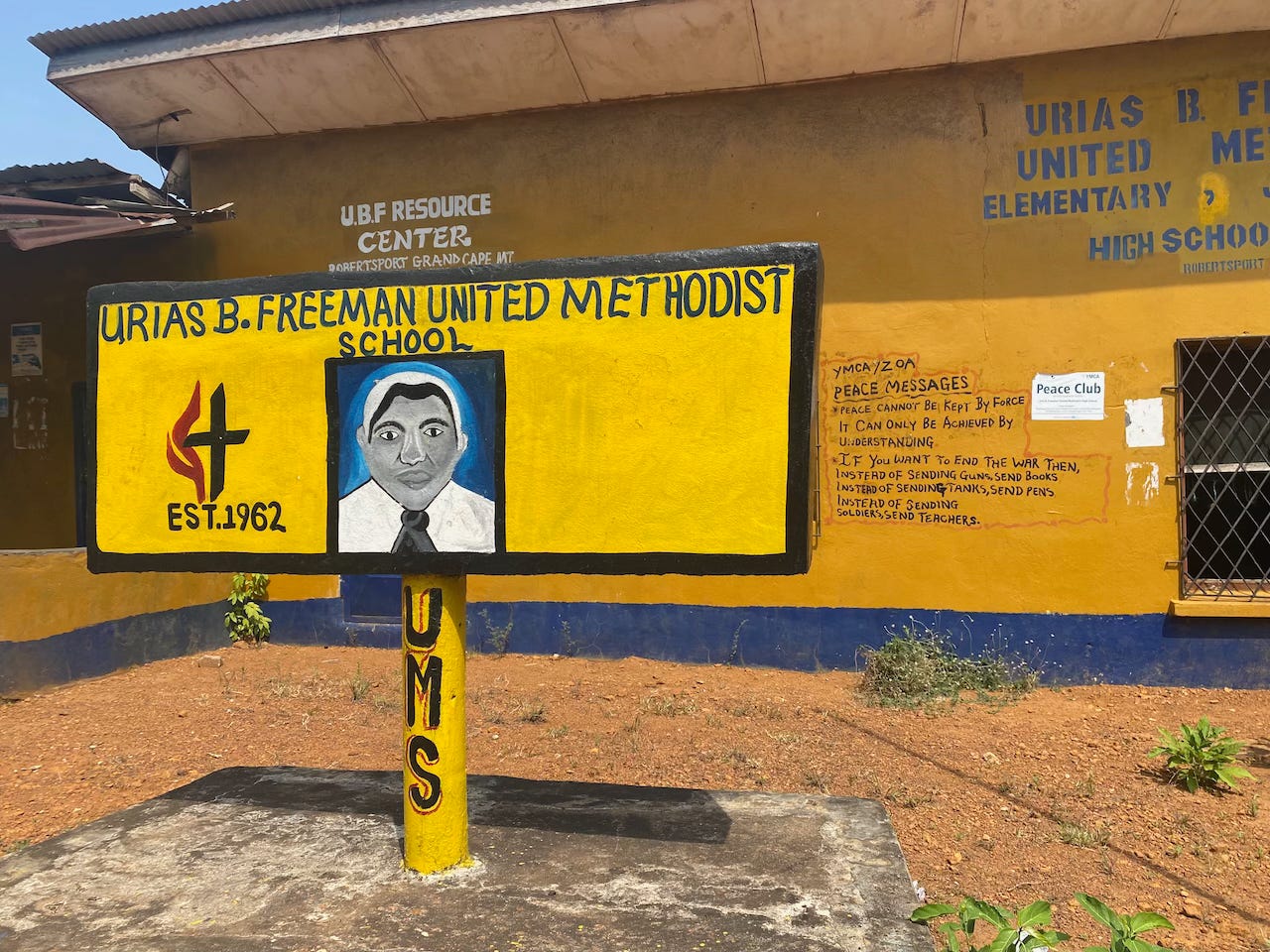











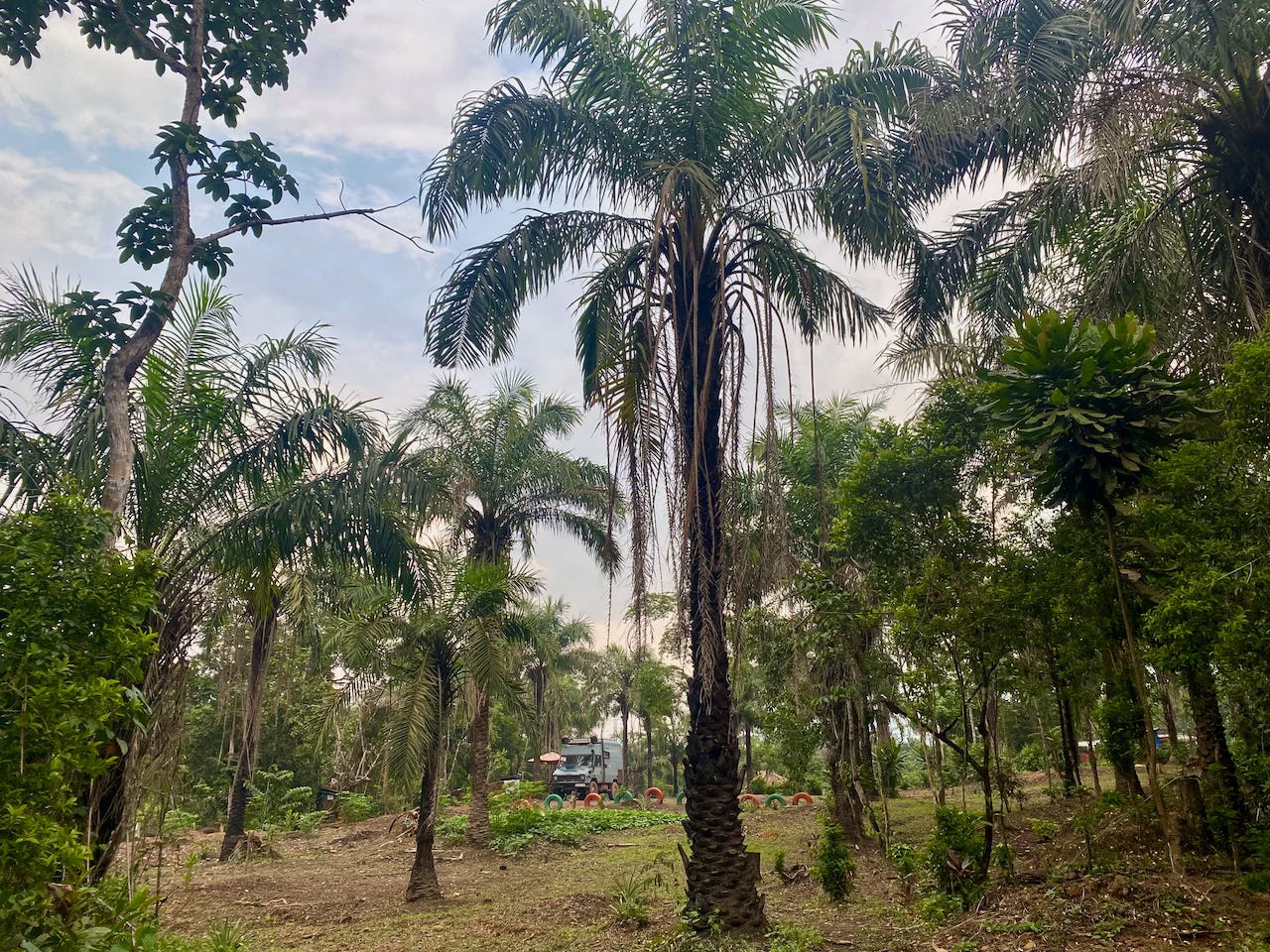

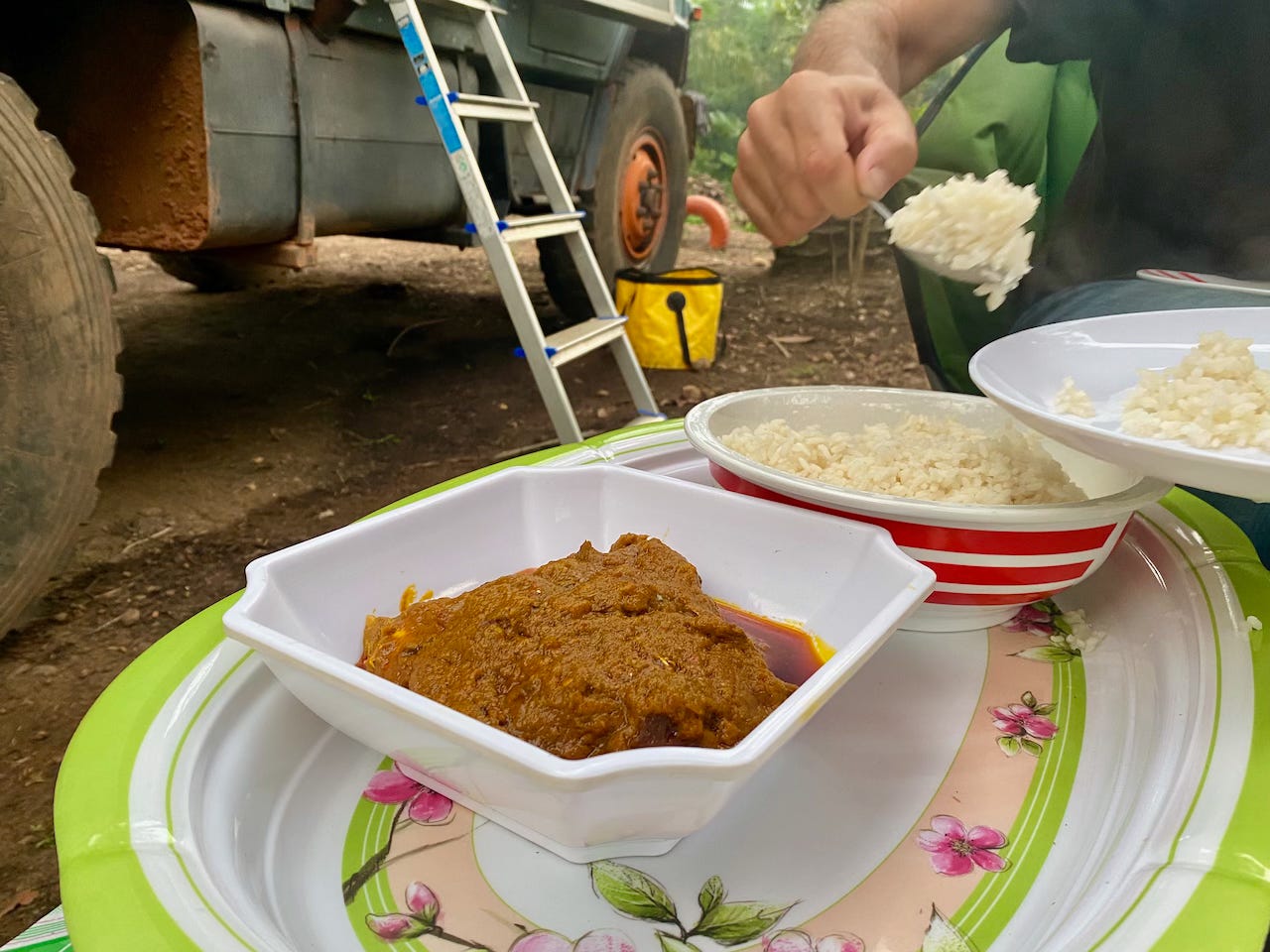





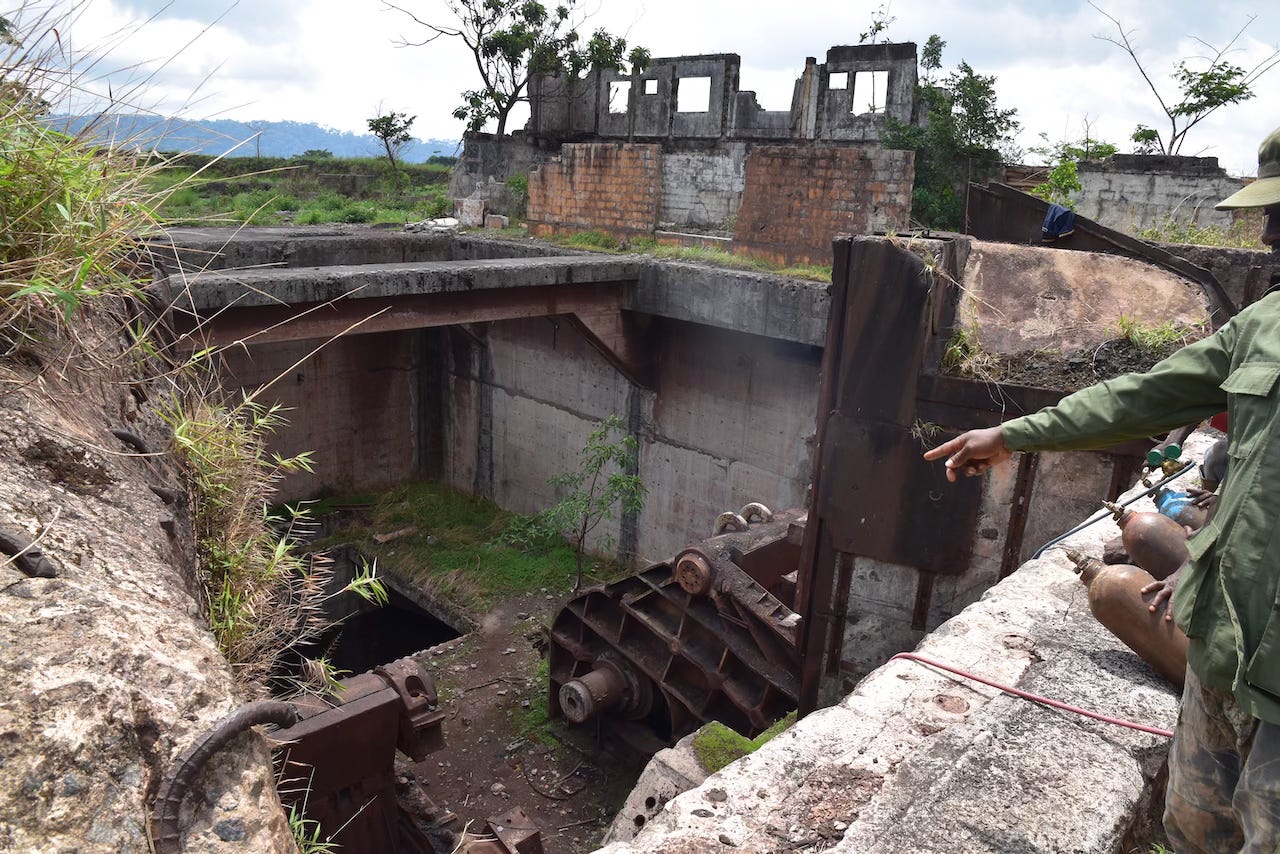

I’m delighted you cured the mouse’s arthritis. I assume that’s why you can’t hear him creaking around any longer
Glad to hear the trip has moved on to soothing waters and - despite the pesky mouse -
a little calmer for you and the readers ! Safe onwards ❤️